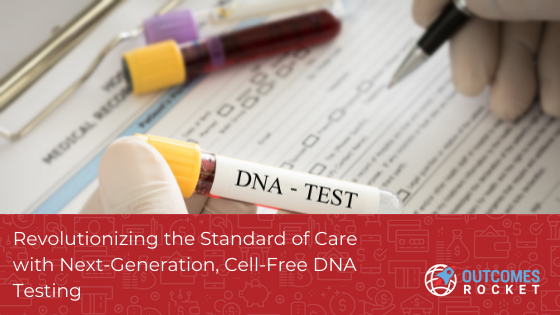
After experiencing repeated miscarriages following the birth of her first child, Lisa Aaronson’s doctor suggested genetic testing. The results indicated Lisa has only 45 chromosomes (most people have 46), which means she has about a 30% chance of conceiving a healthy baby. This news, while shocking, provided Lisa with the critical information she needed to make an informed decision about a future pregnancy. With the help of a team of specialists, Lisa gave birth to a healthy baby boy.1
Like Lisa, some of our best-kept secrets are in our cells. We can easily discover what those secrets are through genetic testing, the process of looking for changes or mutations in the DNA.
The past decade has seen a boom in the popularity of genetic testing. Strides in research and medical technology significantly improved genomic technologies, providing a glimpse into the many genetic-related disorders our cells could be hiding.
One of the leading diagnostic companies focused on DNA analysis is Natera.
Natera is a global leader in providing cell-free DNA (cfDNA) testing with a focus on women’s health, oncology, and organ health. The company is committed to changing the way disease is managed worldwide by using information gained from a simple blood draw to proactively inform treatment.
Natera’s proprietary technology can look at extremely tiny quantities of DNA, making detection easier and more accurate, ultimately saving more patients’ lives.
Since its founding in 2004, Natera has pushed the boundaries of testing management, rolling out innovative genetic tests backed by science and data.
The first application of Natera’s proprietary technology was in Reproductive Health.
Birth defects affect about one in every 33 babies born in the United States each year. In 2013, the company introduced Panorama, a next-generation non-invasive prenatal testing (NIPT) that screens for common chromosomal conditions that affect a baby’s health.
A highly accurate blood test, Panorama can identify certain genetic conditions in the fetus and can identify, for example, more than 99% of pregnancies affected with Down syndrome. It also has the lowest reported false positive rate of any prenatal screening test for the most commonly screened chromosomal abnormalities: trisomy 21, trisomy 18, and trisomy 13.
Panorama’s impact also goes beyond genetics. Historically, health care providers required an amniocentesis in pregnant women over age 35, because, at those ages, the risk is higher for giving birth to a baby with certain chromosome problems. Also, while covered by most insurance plans, an amniocentesis test is expensive. For patients with no insurance, it becomes an out-of-pocket cost, an additional expense.
A non-invasive test like Panorama reduces the need for amniocentesis testing.
Steve Chapman, CEO of Natera, explained that the ability to identify certain genetic conditions in the fetus from a simple tube of blood, as early as nine weeks into pregnancy, is “very important for women, for the pregnancy and for the family to be able to get that kind of information very early on in the pregnancy and potentially avoid a diagnostic procedure. This idea that you can simply do a blood draw rather than having to go in for an invasive procedure that’s costly and carries some risk is very important.”
Following the success of Natera’s technology in Women’s Health, the company turned to Organ Health. The company optimized the same cfDNA technology to enhance the patient and physician’s ability to assess undetected rejection events that might lead to the loss of the transplanted organ.
Prospera is a transplant rejection test that uses a simple blood draw to evaluate the risk of rejection of a transplanted kidney. This technology offers early warning signs of transplant rejection.
Around 20,000 kidney transplants are performed in the U.S. every year. According to Chapman, approximately 30% of kidney transplant patients will lose their kidney within five years, and about 50% of patients will lose their kidney within 10 years.
“With our technology, we’re detecting organ rejection early so the patient and physician can alter the treatment course and potentially save the kidney,” Chapman shared.
Through Prospera, it is now possible to detect organ rejection without an invasive biopsy. Its high accuracy minimizes unnecessary biopsies especially for patients with a low risk of rejection. Further, it allows for easy detection among patients with a high risk of rejection.
Natera has also branched out into the Oncology space, developing Signatera, a personalized, tumor-informed assay optimized to detect circulating tumor DNA (ctDNA) for molecular residual disease (MRD) assessment and recurrence monitoring for patients previously diagnosed with cancer, with broad utility for cancer management.
“With our technology, we take a small piece of the tumor and we create an individual test that’s based on your tumor signature that’s just for you so there’s no other test out there that’s like your test. And we use that to detect very tiny fragments of the tumor in your blood,” said Chapman. “The result of that is that we can detect cancer recurrence in colorectal cancer 93% of the time, up to eight months earlier than what you would on imaging.”
Signatera ctDNA testing is used to detect cancer recurrence in colorectal cancer. Unfortunately, 30 – 40% of patients experience recurrence. When health care providers detect a recurrence too late, it leads to poorer outcomes for the patients. Signatera can detect the recurrence of the diseases up to two years in advance of imaging, so doctors can plan early intervention and potentially save the lives of patients.
Signatera is also used for patients receiving immunotherapy, tumor genomic profiling, and determining the risk of developing common hereditary cancers. It has been granted three Breakthrough Device Designations by the FDA for multiple cancer types and indications.
Natera is continually developing new technologies, staying true to its core of improving the management of diseases worldwide.
For more information about Natera’s tests including Panorama, Prospera and Signatera, visit www.natera.com.
For additional details about Natera, listen to my interview with Steve Chapman here: https://outcomesrocket.health/natera/2021/06/.
1 https://www.youtube.com/watch?v=xmhE3eHdFRI
According to the 2020 Centers for Disease Control and Prevention report, roughly 34.2 million Americans have diabetes,...
Read MoreAs a farmer, Rod was used to long days. He worked 18 hours a day, 7 days...
Read MoreWith investors receiving hundreds of pitch decks every year, how do you create a compelling presentation that...
Read More
Brittany Busse Co-Founder, President, and Chief Medical Officer at
ViTelHealth


Stephen Thorne Founder and CEO at
Pacific Dental Services

Keith Carlson Nurse Career Coach